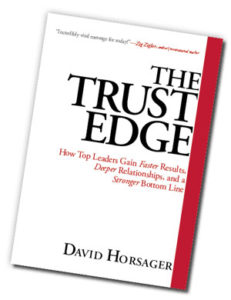We all know that our crops and our livestock are most productive when the conditions around them are optimal – needed nutrients, favorable weather, freedom from disease and injury. Similarly, our workforce – ourselves, family members and employees – is most productive and has the greatest job satisfaction when the conditions are optimal. The conditions, again, are the environment. For people, the environment is, most importantly, the farm or agribusiness culture and the relationships with the other people in the organization. The key to culture and relationships is trust.
I often begin my discussions and presentations on supervision and communication with the statement: “Life is about relationships.” Think about that statement; I think you will agree. We have numerous relationships – our spouses, family, friends, partners, co-workers and employees.
I am not certain we always think of an employer-employee relationship as an interpersonal relationship. It is! Of course, the employer-employee relationship has unique characteristics. All interpersonal relationships, however, have important similarities.
Perhaps the most important similarity is that good relationships, including those with employees, require trust. The dictionary defines trust as “Firm reliance on the integrity, ability or character of a person or thing.” A great book I have recently found – The Trust Edge by David Horsager – defines trust as:
“Trust is a confident belief in someone or something. It is the confident belief in an entity (person, farm, business, government):
• To do what is right
• To deliver what is promised
• To be the same every time, in spite of the circumstances
Trust speaks to being reliable, dependable and capable.”
It is also important to recognize that every interaction with a partner, family member or employee has two objectives:
1. Accomplish the purpose of the interaction
2. Improve the relationship – increase the trust
Stephen Covey, in Seven Habits of Highly Effective People , introduces the idea of an emotional bank account. We have this account for every interpersonal relationship. Each interaction puts deposits – increases trust – into the account or makes withdrawals – decreases trust.
Deposits include listening, compliments (positive feedback), encouragement, training, suggestions. Withdrawals include anger, broken promises, coercion, criticism, lies, pettiness. What is the balance in your emotional bank account with partners, family members, employees, friends, agribusiness professionals?
We now look at three ways to increase trust with employees.
1. Listening
In many of my speaking engagements, I have the participants engage in a role play. In the last two of four rounds they are instructed to completely ignore their role play partner. Think about how you would feel: Frustrated? Angry? Abandoned?
After the role play, the recognition that most of us are not great listeners and the emotion consequences to the speaker are front and center. Great listening is especially important with employees.
In their position as the subordinate, they will tend to be hesitant to bring forth questions, ideas or concerns. Not listening to an employee greatly decreases the likelihood that they will come forward with an idea or concern in the future.
We are all very busy, often with very urgent tasks. Making time to listen is difficult and requires great patience. It is important, however, that you make the time.
If an employee wants to talk when you truly do not have time to listen, be proactive instead of being a bad listener. Tell the employee how important it is to you to hear what they have to say, explain why you cannot visit now and establish a time to talk in the very near future.
2. Clarity
Most employees spend much of their working time trying to figure out what behaviors and performance are expected of them. This uncertainty is frustrating and lowers trust. Clarity – I call it chalking the field – is vital to employee performance, the supervisor-employee relationship, trust and job satisfaction.
I can say with almost 100 percent certainty that your employees are not as clear on what you expect of them as you think they are!
Employees are clear on what is expected of them and will almost certainly have great trust when they can answer three questions:
• What are we working together to accomplish? This is the vision that owners have for the farm. It must be articulated and communicated to employees to provide meaning to their work.
Research shows that working at a job that has meaning is important to all employees. It is of greater importance to those in younger generations – the Gen-Xers and millennials.
• What is expected of me? Both the behavior and the performance expectations must be clearly specific. Especially for performance expectations, providing clarity must be an ongoing effort.
Maximizing employee performance requires processes and systems. This is called a performance management system. I call what I use with my clients the Workforce Success System.
• What must I do today? Every employee must either be able to successfully identify required tasks for today or be provided those tasks by their supervisor. The more experience, training and responsibility the employee has, the more he or she can successfully generate this list without your assistance.
3. Lead by example
Years ago, when I coached my son’s youth baseball team, other coaches often asked me how I was able to get my players to come to practice on time. My secret was that I told the players’ parents the first day of practice: “It is your responsibility to get your son or daughter to practice on time; it is my responsibility to end practice on time.”
And then that is exactly what I did. As other coaches started practice late and let it run over, causing parents to wait impatiently for their son or daughter, the parents put less emphasis on getting to practice on time; they lost trust.
The key to the baseball attendance situation was that I was clear and then I did exactly what I said I would do! Following through on what you say is the third great attribute to building trust.
You must lead by example by following through every single time. By every single time I mean you must always:
• Do exactly what you said you would do, whether it is starting a meeting on time or working with an employee on a task or providing training or feedback
OR
• If for some reason you cannot do what you said, explain why to the employee and reset the expectations.
A final comment
Increasing trust – building relationships – is a vitally important but usually not urgent task. It is easy to get caught up in the urgent and not take the time to do what it takes – listening, clarity, doing what you promised – to increase trust.
Think of taking the time to increase trust as an investment that will increase productivity and greatly reduce the time you spend repairing relationships. PD
Bob is also Professor Emeritus, Dyson School of Applied Economics and Management, Cornell University.

Dr. Bob Milligan
Senior Consultant
Dairy Strategies, LLC
rmilligan@trsmith.com






